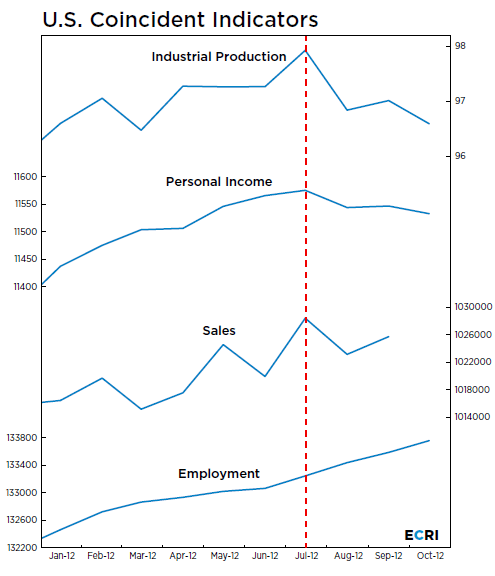ECRI Says the Recession Started in July 2012
According to ECRI the recession they predicted in September of 2011 started in July 2012. Before getting upset the last paragraph in the blog explains the recessions are part of the business cycle, so it is just part of life.Article is in italics and the bold is my emphasis. From ECRI:
Following our September 2011 recession call, we clarified its likely timing in December 2011. Based on the historical lead times of ECRI’s leading indexes, we concluded that, if it didn’t start in the first quarter of 2012, it was very likely to begin by mid-year.
But we also made it clear at the time that you wouldn’t know whether or not we were wrong until the end of 2012. And so it’s interesting to note the rush to judgment by a number of analysts, already asserting that we were wrong.
So, with about a month to go before year-end, what do the hard data tell us about where we are in the business cycle? Reviewing the indicators used to officially decide U.S. recession dates, it looks like the recession began around July 2012. This is because, in retrospect, three of those four coincident indicators – the broad measures of production, income, employment and sales – saw their high points in July (vertical red line in chart), with only employment still rising.

But if we’re in recession, and the business cycle peak was in July, how could employment be higher three months later? Actually, this was also true in three of the last seven recessions – and in the severe ’73-’75 recession, job growth stayed positive eight months into the recession. Thus, positive jobs growth isn’t inconsistent with the early months of recession. Of course, all of this data is subject to revision, but, as we’ve noted before, the ultimate revisions to coincident indicator data after business cycle peaks tend to be downward.
If you look at the size of the simultaneous declines in industrial production and personal income since July, that combination has never occurred outside a recessionary context in over half a century – but it’s occurred in every recession. This leads us to conclude that we are most likely already in a recession that began around mid-2012.
Now, please remember that, following our recession call, central banks really ramped up their efforts, and have literally been pumping more money into the economy than at any time in the history of humanity – and this is the upshot. No wonder the Fed is now all in.
So how come hardly anybody recognizes the recession? Perhaps it’s because of real-time data showing positive growth in GDP and jobs, and the lack of a recent salient shock.
Many believe a major negative shock is necessary to start a recession. But think back to the big shocks in the last two recessions. The 9/11 attacks were widely believed to have triggered the 2001 recession that had really started six months earlier. And many thought that the financial turmoil set off by the Lehman Brothers failure caused the 2007-09 recession that had actually begun nine months earlier.
At the time, with seemingly positive – indeed strongly accelerating – GDP growth in the first two quarters of 2008, most didn’t realize that a recession was already in progress when Lehman collapsed. The week after, Chairman Bernanke, pressing Congress to enact the TARP legislation, said to the Senate Banking Committee that if it wasn’t passed, “jobs will be lost … [and] GDP will contract” – namely, a recession would ensue.
Sounding a similar tone last week, he warned that if the fiscal cliff wasn’t avoided, it “would send the economy toppling back into recession.” Once again, he seems unaware that a recession is underway.
So, what does this recession mean for people? The bottom line is that production, income and sales will keep trending down for now, and employment too is likely to turn down.
Nobody likes to be the bearer of bad news, but a recession isn't the end of the world. There have been 47 recessions in the past 222 years and, as before, we’ll see renewed growth after the 48th. Because business cycles are part and parcel of how all market economies operate, that’s about as close to a sure thing as it gets.
No comments:
Post a Comment